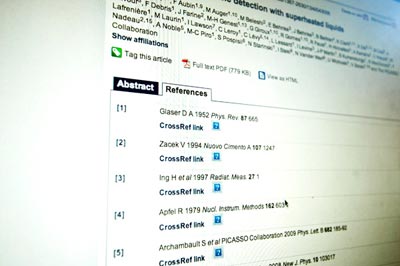
Making a research paper free to read online is likely to increase the number of times it is viewed – but it will not make the article more likely to be cited by other researchers. That’s the conclusion of a new study by Philip Davis, a communications researcher at Cornell University in the US. His finding adds fuel to the debate over the advantages of open-access publishing, which supporters promote as a fairer and more effective system for the dissemination of scientific information.
If open access has an effect on article citations, its effects are much smaller than previously reported
Open-access publishing comes in a variety of forms but its essence is to make academic papers free to all by abolishing journal subscription fees. Instead, the author usually pays a fee to have the paper published. Physicists have been at the forefront of making scientific data more freely available. For instance many researchers publish preprints of their papers on the arXiv.org server, or post links to physics preprints on the SLAC-SPIRES database.
The debates over who should pay and who should profit in academic publishing are well established and they often come down to political and business choices. But in recent years, some researchers have attempted to quantify the benefits of open access to the individual researcher who is seeking to publish their research.
Opening access
In this new study, Davis considers 3245 papers published between January 2007 and February 2008 in 36 journals spread across the sciences, social sciences and humanities. With the permission of the participating journals – and without any involvement from the publishing authors – Davis randomly assigned 712 articles as open access. The remaining 2533 articles were only available to subscribing individuals and institutions.
Three years down the line, Davis discovered that the open-access articles had received significantly more downloads and reached a broader audience. But despite this, these papers were not cited any more frequently, nor any earlier, than the subscription-access articles. “If open access has an effect on article citations, its effects are much smaller than previously reported,” Davis told physicsworld.com.
Although Davis’ study did not cover any pure physics journals, the findings agree with a related study from 2007 co-authored by the Harvard University physicist Michael Kurtz, which considered papers published in the online version of Astrophysical Journal. This journal put up a subscription barrier at the start of 1998, having previously existed as a fully open-access publication. Kurtz showed that papers published in 1997 received no more citations than papers published in 1998, when accounting for other factors.
Both Davis and Kurtz come to the same conclusion to explain why there appears to be no citation advantage in making a paper open access. They believe that papers published in core journals are likely to come from the mainstream institutions that have comprehensive access to subscription journals. In other words, when it comes to getting their hands on research papers, it does not matter to the most prolific scientists whether the papers are open access or not.
Sample too small?
However, not everyone agrees with this conclusion. Stevan Harnad, an information scientist at the University of Southampton in the UK, published a study last year in the journal PLoS One reaching the opposite conclusion – that open access does bring increased citations. Harnad criticises Davis’ new study partly on the grounds that the sample size is too small. He says that the published studies confirming the citation advantage outnumber those that do not by 8:1.
Davis defends the size of his sample, saying that his study’s strength lies in its ability to rule out external factors that determine which papers are made freely available, such as an author’s willingness to pay the open-access fees. “By implementing a true randomized controlled trial, we were able to more accurately isolate and estimate the effect of access from all other explanations,” he says.
Davis believes that the real beneficiaries of open access may be the communities that consume but rarely contribute to the corpus of literature. “It is unfortunate that some read our paper as an attack on open access, when it is not,” he says. “Indeed, it suggests that there are real benefits to the free access of the scientific literature. A citation advantage, however, is not one of them.”
[This finding] doesn’t negate the utility of open access, either to researchers or to the general public, but clarifies better what is the long-term role it plays Paul Ginsparg
Paul Ginsparg, the quantum physicist at Cornell University who developed the arXiv server in the early 1990s, agrees that the result does not spell bad news for the open-access movement. “[This finding] doesn’t negate the utility of open access, either to researchers or to the general public, but clarifies better what is the long-term role it plays.”
The Davis study is published in the Federation of American Societies for Experimental Biology Journal.



